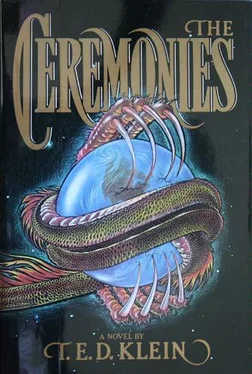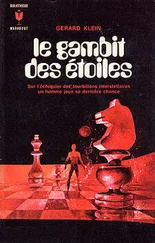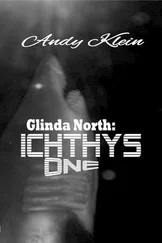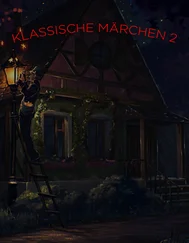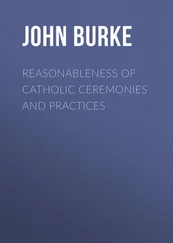T Klein - Ceremonies
Здесь есть возможность читать онлайн «T Klein - Ceremonies» весь текст электронной книги совершенно бесплатно (целиком полную версию без сокращений). В некоторых случаях можно слушать аудио, скачать через торрент в формате fb2 и присутствует краткое содержание. Жанр: Ужасы и Мистика, на английском языке. Описание произведения, (предисловие) а так же отзывы посетителей доступны на портале библиотеки ЛибКат.
- Название:Ceremonies
- Автор:
- Жанр:
- Год:неизвестен
- ISBN:нет данных
- Рейтинг книги:3 / 5. Голосов: 1
-
Избранное:Добавить в избранное
- Отзывы:
-
Ваша оценка:
- 60
- 1
- 2
- 3
- 4
- 5
Ceremonies: краткое содержание, описание и аннотация
Предлагаем к чтению аннотацию, описание, краткое содержание или предисловие (зависит от того, что написал сам автор книги «Ceremonies»). Если вы не нашли необходимую информацию о книге — напишите в комментариях, мы постараемся отыскать её.
Ceremonies — читать онлайн бесплатно полную книгу (весь текст) целиком
Ниже представлен текст книги, разбитый по страницам. Система сохранения места последней прочитанной страницы, позволяет с удобством читать онлайн бесплатно книгу «Ceremonies», без необходимости каждый раз заново искать на чём Вы остановились. Поставьте закладку, и сможете в любой момент перейти на страницу, на которой закончили чтение.
Интервал:
Закладка:
No one was about. The porch was empty save for a straight-backed wooden bench; the front door was closed, the windows shuttered, the place as quiet and deserted an empty film set. There were no street signs to be seen, not even a sign above the building, and there'd been no words of welcome down the road. But Freirs knew, even before the bus driver turned and announced the name, that at last he'd reached Gilead.
The bus left him standing alone before the store, holding his jacket and his envelope of clippings. As Deborah Poroth's letter had warned, there was no one to meet him, and as he turned to look around, he felt marooned. Across the street, set well back from the road behind a line of massive oaks, stood a building that he guessed to be a school – a square red-brick structure with a patchy brown playing field beside it and two lonely seesaws in front. At the opposite corner, on a piece of ground slightly higher than the rest, stood a little cemetery, old but obviously well tended, though here and there a tombstone was askew, like trees after a storm.
The sound of the bus's engine faded beyond the curve of the road, leaving a silence broken only by the buzzing of insects and the occasional cry of a bird.
Freirs hadn't really expected the town to be this small. He'd expected at least a town center, someplace for the populace to meet. Yet except for the schoolhouse back behind the trees, there appeared to be no civic buildings of any kind, not even a Grange hall or an American Legion post.
What surprised him most of all was the absence of a church. From where he stood he could see. nothing but well-scrubbed houses bordering both sides of the road, and maples and oaks whose new foliage looked cool against the burning blue sky, the treetops receding into the distance toward a line of low green hills. The skyline was unbroken by either a golden cross or a slim white steeple. Perhaps services were held in some simple one-room tabernacle concealed behind a bend in the road.
Turning, with a sigh, toward the clapboard building – obviously the Co-operative mentioned in the letter, though for a store it was curiously bare of window placards and advertising – he climbed the steps to the front porch, wishing there were somewhere around to take a pee. The bench did not look comfortable, and wasn't. Above him, as he sat, he noticed a row of ominous-looking iron hooks protruding from a beam in the porch ceiling. Probably where they hung the sinners. He wondered, briefly, what sins lay on his own head.
He sat for a few minutes, savoring the silence. He was going to like this place, if the farm was as quiet as the town. Who knows, even boredom might be welcome. Tedium as Therapy: The Uses of Ennui. Time as a Function of… He was already beginning to feel drowsy. All those hours on the bus, and now this heat and solitude: it took a lot out of a body.
His bladder was full, though, and there seemed little likelihood there'd be a bathroom handy. Typical, that he hadn't thought to go back there on the goddamned bus. Opposite him, by the schoolyard, a line of oaks made patterns of shade along the roadside; inviting, but he'd be too conspicuous there. Past the farther corner the stone slabs of the cemetery stood bathed in sunlight; behind them rose secluded clumps of trees. That was the likeliest place. Besides, there might be some interesting old tombstones; do some rubbings there someday. At least it would help pass the time.
He strolled down the porch steps and across the street. Climbing the slope to the cemetery, he felt self-conscious. What if they didn't like strangers walking over great-granddaddy's head? That probably wasn't the case, though. People around here would be proud of these things, of how far back their families went.
Here was one, for example; he stood looking down at a small white headstone that the years had worn almost smooth. Ephraim Lindt; who Died 1887 in the 63rd year of his Life. That wasn't as far back as he'd expected. Obviously you couldn't go by the condition of the stone; the white ones tended to weather more.
Nearby he saw an older one that had held up better. Johann Sturtevant, Call'd to His Maker 1833, Aged Fifty-One. His Dutiful Wife, Korah, Join'd with Him in Heaven 1870, Aged Seventy-Eight. Jesus, a widow for almost forty years, and in a place like this.
Farther back stood a small stand of willows and, behind them, a scraggly hedgerow. He approached them, unzipping his fly, and let loose a splattering yellow arc on the base of one tree. Insects circled round in protest. Off to the right he could see the assemblage of headstones regarding him like an audience – Buckhalter, Stoudemire, van Meer – but there was no one to see him but the ghosts of the dead, and surely they were tolerant. Envious, even. How long had it been since his citified cock had been touched by actual sunlight? Damn, but this place felt healthy! Zipping up and with nothing to flush, he wandered back to the graves.
Slowly he made his way through the aisles, stopping at intervals to read the inscriptions on the older stones. Their quietude, the sense of souls and bodies in repose, had begun to make him drowsy again. Many of the stones had faces on them, or angels' heads, or skulls; some of the more modern ones had willows, like the one he'd just watered. There were also smaller headstones, for children. Picturing the tiny wooden coffins, Freirs tried to imagine how parents must have felt in an era when half the population died in childhood. Maybe, in those days, they didn't mind so much.
Often married couples shared a single stone, but a number of others were in pairs, one for the husband, one for the wife, as if, in life, they'd slept apart and now saw no reason to change. Here lay the van Meers, Rachel and Jan, their gravestones side by side like bedboards. On hers, 1845 to 1912:
Such as I am,
Thus shall thou be.
Just a cheery little reminder. And hubby, 1826 to 1906:
Let this to thee a Warning be:
Quickly thou must follow me.
Not something he felt like thinking about right now. Later, maybe. He moved farther down the row, wiping sweat from the back of his neck. Maybe it was the sun that made him tired.
Butterflies flitted between the tombstones; bees poked among the tall grasses along the bottom of the hill. He looked once more toward the store across the street. The door was still shut; no one had returned.
Near the end of the row he stopped to puzzle out another inscription; the stone was of slate, and chipped almost beyond reading. Getting up again required too much effort. Dropping his jacket and envelope, he sat himself on the grass and stretched his legs, his feet merging with the shadow of the adjoining monument. It was the largest object in the row, a dark four-sided column whose top was jagged and oblique, yet obviously sculpted that way, as if to suggest that the shaft had been broken off. He craned his head back to read the words. The thing appeared to commemorate an entire family; a way of saving money, perhaps. You left a little space after the names, and, one by one, as the people dropped off, you added the years they died.
Isaiah Troet
1839 – 1877
Hanna Troet
1845-1877
They had died the same year. Well, sometimes grief did that to people. Was it happier that way, or even sadder?
His eyes felt heavy. He lay back in the sunlight, cradling his head in the grass, and squinted up at the rest of the names.
THEIR CHILDREN
Ruth 1863-1877
Tabitha 1865-1877
Amos 1866-1877
Absolom 1868 Tamar 1871-1877
Leah 1873-1877
Tobias 1876-1877
Odd. They all had died that year. Some sort of disaster, maybe. Plague, flood, famine in the land.
His eyes closed. Sunlight beat against the lids, while blades of grass brushed his cheek. For a moment he had a vision of long-lost souls with funnily spelled names.
Читать дальшеИнтервал:
Закладка:
Похожие книги на «Ceremonies»
Представляем Вашему вниманию похожие книги на «Ceremonies» списком для выбора. Мы отобрали схожую по названию и смыслу литературу в надежде предоставить читателям больше вариантов отыскать новые, интересные, ещё непрочитанные произведения.
Обсуждение, отзывы о книге «Ceremonies» и просто собственные мнения читателей. Оставьте ваши комментарии, напишите, что Вы думаете о произведении, его смысле или главных героях. Укажите что конкретно понравилось, а что нет, и почему Вы так считаете.
